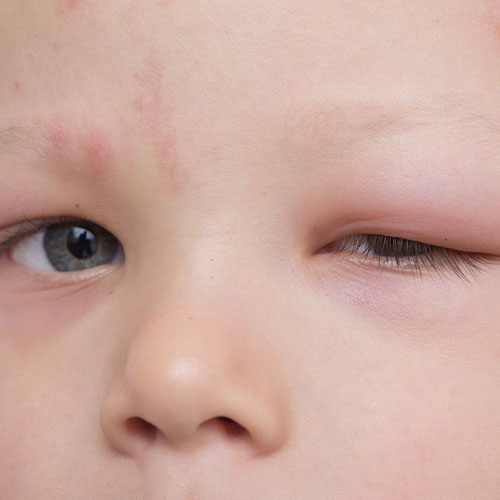Home > Allergy Education > eye allergy
Eye allergies, eye allergies in children, causes of eye allergies
The air quality in Hong Kong poses serious health problems, which explains the number of people with eye allergies is increasing day by day. The Public Opinion Programme (POP) at the University of Hong Kong interviewed 511 patients in between the age of 18 and 60 who had developed eye allergy symptoms in the past year. It was found that 32% of the respondents had eye allergy symptoms at least every week, such as itching or sore eyes and are usually relieved by eye drops.
Eye Allergy Symptoms
Common symptoms of eye allergies are itchy eyes, sore eyes and swollen eyes. Your child may experience signs and symptoms of red, itchy or swollen eyes with frequent eye rubbing, and he/she might blink more often to ease the itchiness. Minor eye allergies in children can lead to difficulty in falling asleep, unstable mood and slow learning progress, while more severe eye allergies can lead to eye inflammation, skin, cornea or conjunctival damage, as well as long-term vision damage.

Eye Sensitivity Causes
Allergy testing is a good option! To prevent eye allergies, reduce exposure to allergens. Pet hair and dust, dust mites on sheets and curtains, etc. may be the allergens that cause eye allergies. Avoid raising pets in houses that have children with sensitive eyes.
Eye Allergy Treatment
Avoid eye contact with your children if you have eye allergies. If parents find out that their children may have eye allergies, they should avoid buying medicines and eye allergy drops themselves, this is to prevent any possible side effects and possible misuse of medicines that may harm the eyes even more. Parents should bring their children to see an ophthalmologist for proper treatment and to conduct an allergy testing as soon as possible.
Desensitisation Therapy
Desensitisation Therapy Desensitisation therapy can significantly improve allergic conjunctivitis (eye allergy). A lot of studies have shown that early desensitisation therapy can reduce the chance of contracting asthma in children as they grow up.
Sublingual immunotherapy, an approach of administering allergens orally, contains a specific amount of allergens to help patients gradually build up their immune system. After a period of immunotherapy, when the patient is exposed to the same allergen again, the allergic reaction will greatly subside. In other countries, specifically Europe, sublingual immunotherapy is becoming more general.
Sublingual immunotherapy solution only needs to be carried out once a day, and patients can take the medicine at home without having to visit the clinic regularly.
At present, only three types of sublingual desensitizers are available in Hong Kong, which can be used for patients who are sensitive to mites, cats or dogs. Patients with other and multiple allergens still need desensitisation needles.
Free
-

Meddx Allergy
The Hong Kong Allergy Test Centre provides a series of clinically proven allergy solutions, dedicated to allergen testing services and allergy prevention products. Our products and services include IgE Blood Allergy Test - Quick Sensitivity Test/Faber/Ailergy, Skin Prick Test for Infants, Skin Patch Test and Anti-Mite Beddings.
Website
